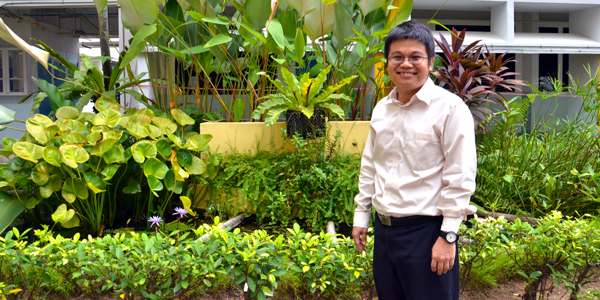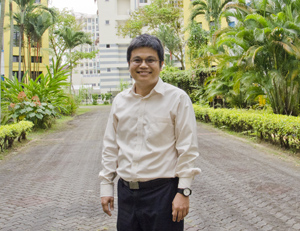Young Children’s Voices in Mathematical Problem Solving
Contributed by Dr Ho Siew Yin and Sng Wei Qin Abbie, from NTUC First Campus, for SingTeach Virtual […]
Read More
Head of Department (Craft & Technology) at Bishan Park Secondary School Mr Ng Joon Yong, having recently completed his Critical Inquiry paper that studied teachers’ conceptions of assessment in Design & Technology, shares with us some of his understanding and insights on student assessment in classrooms.

Ng Joon Yong feels that students’ learning processes are just as important as the measurable outcomes.
When we talk about assessment, it’s pretty common for most people to instantly link it to formal examinations which is summative in nature. Assessment itself is a very big topic. It includes formative function where data collected is used to improve students’ learning.
From the scholarly perspective, assessment is the process of gathering data and interpreting them for decision-making. Gathering data refers to the collection of evidence of learning through various methods such as setting a test, listening to your students’ questions and answers, or observing their body language during a lesson. Interpreting data involves comparing the evidence of learning. Do we compare the evidence of learning among peers, against the desired outcomes, or against students’ own learning goals?
The purpose of decision-making sets the context for data-collection and interpretation; why are we gathering these data and how are we going to interpret it? For example, if the purpose is to help students to improve their learning, then we should gather data and compare them against our desired outcomes.
The method of data collection therefore hinges on the purpose for decision-making: Do we simply want to make a judgement call or do we want to look for ways to help students improve based on their assessment results?
“Do we compare the evidence of learning among peers, against the desired outcomes, or against students’ own learning goals?”
– Joon Yong, on the deciding factor for data-collection and interpretation
There is a very strong relationship between assessment and learning. The kinds of assessment performed on students will lead to corresponding kinds of learning. This means that after a while, our students are able to pick up assessment patterns and they tend to exhibit behaviours that are consistent to the kinds of assessment conducted in the classroom.
For example, if the teacher focuses his or her assessment on recall memory, after a while, students will be able respond to exactly what the teacher wants – regurgitated information based on memory. But if the assessment is about analysis, deep thinking and self-regulation, students will learn how to make judgements about themselves and their learning.
In addition, different people have different levels of attainment and that could result in varied consequences arising from assessment. For students with higher levels of attainment, they could be motivated by assessment.
On the flip side, the same assessment can be demoralizing for students who are not as high-achieving as their peers. Therefore, we have to manage assessment well because the same thing that motivates one student can demotivate another.
One of the best ways to perform effective and motivating assessment is to guide students to take reference from themselves to try to overcome their own difficulties, rather than comparing results with their peers.
In Design & Technology (D&T), students’ performance is assessed through coursework examination which entails a long-term project of identifying a problem, constructing a solution to the problem, and eventually producing an artefact that solves the identified problem.
In the past, I was very much guided by the design process and assessment rubrics; I was focused on the outcomes that were defined and measured by the rubrics so that my students could do well for their examination. But after a while, I realized that it is not just about the measurable outcomes, but also about the students’ learning process as they work on their own projects as well as the design intuition that they develop and use during the process.
Do they become better learners and thinkers? How do my students draw upon prior experience as a resource to make decisions? I also consciously question myself: Are they better people too and not just intellectually, but morally? These are the intangibles that cannot be easily measured. In essence, it is not about completing a project but also about what they have learned, what competencies they have built, and what values they have acquired in the process of completing the coursework examination. In fact, some teachers say that assessment is also about knowing the student, so that we can better help them grow.
Design is a complex and sometimes chaotic process. I keep reminding myself it is a design process not the design process, so that I will not end up “teaching to the rubrics”. Assessment has become more complex; the judgement is no longer just from the teachers but also from the students. I would like to see my students making their own judgement calls about themselves and exceed their own expectations rather than just what I expect of them.
As teachers, we should reflect on the things that we do and say and be conscious about the way we deliver our message to the students.

As a teacher, Joon Yong believes that it is important to be conscious about the way messages are delivered to students.
The nature of coursework has put a lot of responsibility on the teachers and we need to know what entails good assessment practices.
Firstly, we need to ensure the coursework assessment is valid. When supervising the coursework, we need to advise the students in the problem that they have decided to work on. If a student chooses a problem that does not give them the scope to demonstrate their competency and understanding, we will not be able to measure what the examination intends to measure and that makes the coursework invalid and irrelevant.
Frequently, students know more than what they can tell. However, we can only make judgement of their understanding based on the evidence they produce. Thus, it is important to ensure that they document their project process well. One way is to ensure that they record their thought process in real-time. This disclosure of evidence also helps to enact communication and allows teachers to provide feedback for improvement.
Teachers might not realize it, but assessment largely takes place in classrooms and beyond each subject’s formal assessment formats. This sort of informal assessment happens during interactions in the classrooms when students say things which teachers would naturally want to respond to.
This process of listening and responding to a student is in itself a form of assessment, because information is gathered to which feedback is given. Teachers should remind themselves to slow down and listen attentively in order to process the information gathered so as to provide accurate and appropriate feedback to the students.
As teachers, if we keep reiterating about learning, making own judgment and overcoming difficulties, after a while our students will see that it is not about the grades, but the skills they have acquired.